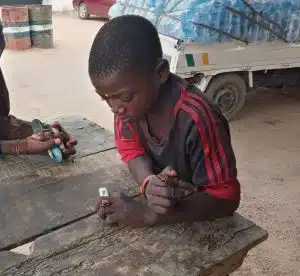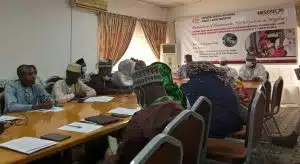Although not an Almajiri, like other boys, the hardship in his family propelled him to hustle because apparently, his parent cannot afford to take care of both him and his remaining 14 siblings. Belonging to a family where both parents can barely cater for some family members wasn’t Habubakar’s wish but it is a sad reality he has to deal with.
Born to a family of 17, Habubakar has been toiling daily to meet his needs and also assist his younger ones. He cannot remember when he started labouring to fend for himself but all he knows is that he grew up into hardship all because his parent couldn’t provide him with the basic needs such as food, clothes and petty essentials. He lives with his family in Fagge Local Government in Kano State.
“It is very difficult to feed in my family. I have to regularly pack dirt to earn a living so I can provide for my basic needs. I live together with my parent and siblings and because we are so many in number, it is very difficult for my parent to provide for us. I just like my other siblings have to go out to fend for ourselves.” Habubakar said as he became emotional.
- Surviving from refuse – through the eyes of Kano’s Yan Shara
- COVID-19 fatalities increase by 80% in Africa, driven by Delta variant — WHO
- Emir tasks subjects on childbirth spacing in Nasarawa State

A reason why Habubakar and similar children have to pass through this horrible childhood is because Family Planning isn’t optimized. Belonging to a family where the parent barely provides for the needs of the children means that his younger siblings would also have to pass through this terrible experience or be at the mercy of people who might give them alms (street begging) when they come of age.
Asides from the physical hazards young children like Habubakar face as they struggle to survive daily, the emotional disturbance they face when they see other children like them receiving the care or attention of their respective parents in the society could be saddening.
Beyond having to pass through an appalling childhood as a result of poor family planning, some children do not make it past a few months after birth, likewise their mothers. Maternal and Child mortality has been an issue which governments and civic organizations have been trying to ameliorate in Nigeria over time. However, impending issues such as lack of transparency, inclusion, accountability amongst others have hampered the actualization of a society where Family planning is deeply leveraged on, to ameliorate issues that children like Habubakar face, amidst maternal/child mortality.
In a bid to contribute to changing the narrative and saving lives of women and children and to see that children like Habubakar do not have to go through a horrific childhood as a result of poor family planning, the Resource Center for Human Rights and Civic Education (CHRICED) via its project which seeks to strengthen maternal and child healthcare through accountability interventions in Kano believes that positive changes would be recorded, irrespective of the reality that Nigeria contributes to 20% of global maternal mortality.

While harnessing the power of the media and Civil Society Organizations (CSOs) remains paramount to the course of CHRICED’s project, it seeks to bring solutions to the dampening state of the country’s maternal health service delivery chain by squarely addressing issues of corruption, inefficiency and lack of accountability as important steps towards stimulating changes in service delivery, notwithstanding the participation of citizens in seeking solutions to issues of Maternal and Child mortality.
Section 14(2) (C) of the 1999 constitution, citizens are provided with the quest to ensure their participation in governance process. It reads “the participation by the people in their government shall be ensured in accordance to the provisions of this constitution.”
While charging the media and CSOs to collaborate towards ensuring accountability and responsiveness in the use of resources for the wellbeing of citizens in the training it organized for media and CSOs on harnessing the power of the media and CSOs towards strengthening accountability in MNCH interventions in Kano, Prof. Momodu Kassim Momodu the Chairman of CHRICED stated that collective efforts would strategically yield results in grey areas which needed interventions.
“We also have a big role in exposing corruption in MNCH projects because if we do not take the initiative, we have indirectly abdicated our responsibility. As media and CSO therefore, you must become a lot more interested in what happens to the MNCH projects in Kano state, particularly in Gwale and Kumbotso Local Government areas” he explained.
Upon the successful actualization of this project, it is expected that maternal and child mortality would be brought to the barest minimum in the select LGAs and possibly spill over to other LGAs. Also, children like Habubakar who have to go through a painful childhood because their parents shunned family planning, would be reduced in the society.


